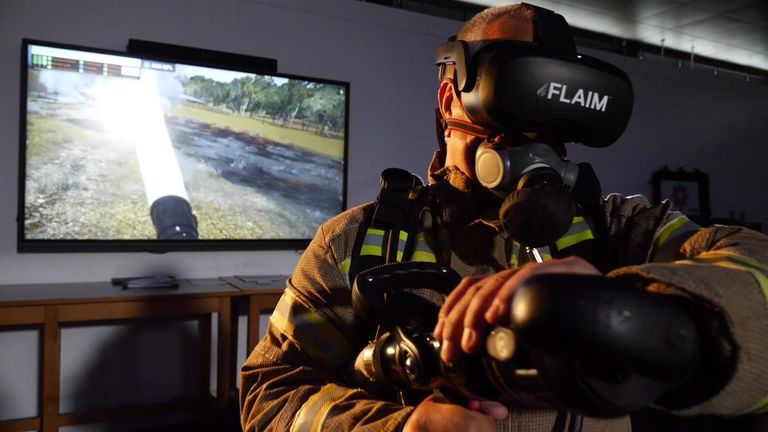It’s summer season in the Northern Hemisphere and wildfires have been raging in Greece, Madeira and France.
As the risk of forest fires changes in a hotter climate, so is the way firefighters respond to them.
Traditionally firefighters have practised with live fires to prepare for the real thing.
But these come with risk, cost and damage to the environment by way of air pollution and water use.
The Fire Service College (FSC) in Gloucestershire, which trains UK and international fire services, has increasingly been using virtual reality to train crews for the real thing.
The headsets play gaming-like scenarios of wildfires for trainees to tackle.
Thomas Dexmier, assistant vice president of enterprise solutions at HTC VIVE which makes the headset, said: “It enables trainees to learn, practise and make mistakes in a safe, risk-free environment, with endless repeatability, and importantly, build confidence.”
The kit includes a haptic vest that generates heat, to give an idea of how someone will perform when working in real heat.
A haptic hose that replicates the weight and feel of a real hose.
And when you open the hose branch (the lever that turns on the hose) in the VR, it turns so heavy it makes you lurch with the weight.
The idea is to trick the body into believing the scenario is real, and engaging the senses aides memory.
It makes your body “believe you’re there”, according to Mr Dexmier.
Mick Dewer, who had just tried out the kit for the first time at the college, said: “That’s about as realistic as you are going to get.”
He added: “When I first opened the branch, I didn’t expect anything like that… I was actually breaking into a sweat holding it and trying to keep it in check.”
The college uses VR to practise for various types of fire, but it’s particularly useful for those that are rare, and hard to recreate in training, such as fires in forests, ships or planes.
Whereas instructors can set fire to designated buildings on the training ground, they can’t just ignite a forest or stretch of grass.
It’s hard to imitate the scale and spread of a forest fire, and risks spiralling out of control.
Ted O’Brien, director of customer experience for FLAIM Systems, which makes the software, said: “In the virtual environment, we are able to replicate at any scale we want, and bring as many people as we want into that – so that’s from firefighters through to commanders.”
Fire services in 45 countries are now using FLAIM Systems to train their teams, according to the company, including the UK, US, Australia, China, Greece, Spain and France.
VR not a ‘substitute’
While using the VR reduces the need for live practice fires, it can’t replace them altogether.
“It’s not a substitute for the real firefighting. It’s a blended approach,” said Paul Speight, an instructor who has pioneered emerging technology at the college.
In VR training “you know at the back of your mind you’re in a classroom, and you’re safe”, but it allows personnel to test “their skills, knowledge and competence in the virtual world” before they tackle live fires on the training ground, he said.
Why the wildfire threat is changing
Climate change is increasing the risk of wildfires and the number of extreme fires, said Theo Keeping, a wildfire scientist from Reading University.
“We’re seeing days that are much hotter and much drier, and we’re also seeing those days happen much more often.”
Such conditions allow wildfires to “spread very rapidly”, regardless of how they may have started, he added.
Climate change made the UK’s hot summer of 2022 more likely – according to climate scientists at World Weather Attribution – when blazes spread out of control and torched homes in east London.
That’s why the FSC now runs a bespoke wildfires course, and is developing further training to help forces prepare.
Now the risk is “foreseeable, we’ve put training together to deal with that”, said Mr Speight.
“It’s the climate that’s caused us to look at things in a different way.”



























